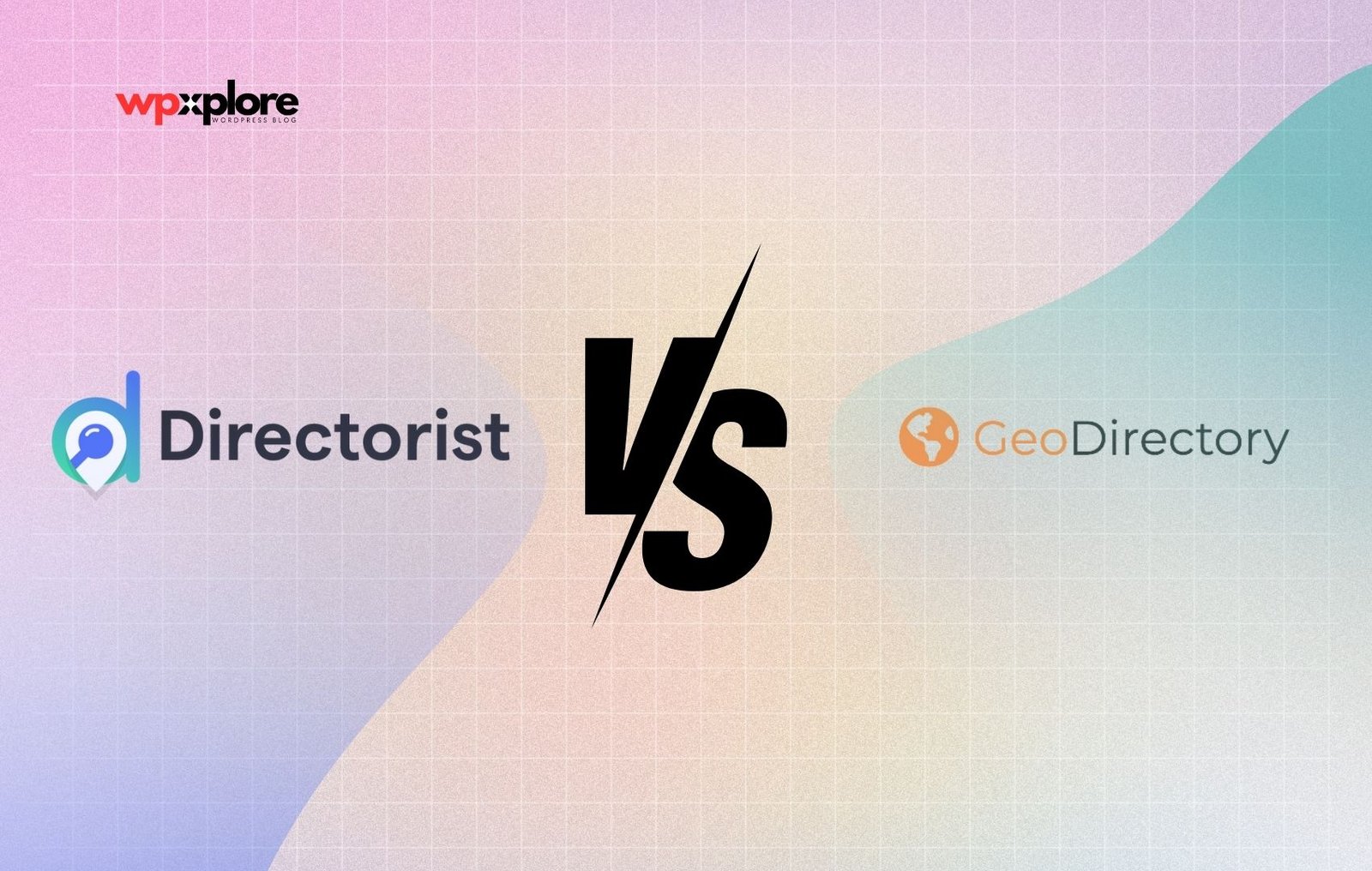Choosing the right WordPress directory plugin can be challenging due to the numerous available options in the marketplace, each with unique features, pricing, and user reviews. Making the wrong choice could lead to a poor user experience, limited functionality, and lost revenue.
You might be wondering: which plugin will meet your business needs, offer scalability, and provide excellent support without being too expensive? Should you choose Directorist or GeoDirectory?
This article compares Directorist vs GeoDirectory based on features, pricing, performance, and active installations, helping you confidently pick the best option for your directory website.
Overview of Comparative Analysis
Contents
- Overview of Comparative Analysis
- Directorist vs GeoDirectory
- Final Note
- 1. What is the primary purpose of directory plugins?
- 2. Is Directorist free to use?
- 3. Can I create multiple directories with the Directorist?
- 4. How does GeoDirectory handle geolocation?
- 5. Are these plugins compatible with page builders?
- 6. What payment gateways does the Directorist support?
- 7. How can I get support for these plugins?
- 8. Which plugin is better for SEO?
We will compare Directorist and GeoDirectory based on their main features, user-friendliness, and overall performance to help you choose the best plugin for your directory needs.
a. Features and functionalities
Directorist and GeoDirectory offer strong directory management functionalities such as creating and managing listings, custom fields, and powerful search capabilities. While Directorist provides multi-directory support, GeoDirectory excels in location-based searches and geolocation features.
b. User experience and ease of use
Directorist provides a more streamlined setup with pre-built templates. On the other hand, GeoDirectory may require additional configuration due to its extensive geolocation functionalities. Both plugins offer drag-and-drop builders and integrations with popular page builders like Elementor. Directorist also offers better flexibility for business-oriented directory needs, while GeoDirectory’s powerful mapping options can be slightly more complex for beginners.
c. Performance and speed optimization
GeoDirectory is designed to handle large-scale directories and multi-location searches, ensuring quick load times. Directorist, while equally efficient, may require optimization for very complex multi-directory setups.
Directorist vs GeoDirectory
Let’s look at the comparison of Directorist vs GeoDirectory Plugin for building any directory website.
1. Active installations and ratings
Now, let’s delve into the active installations and ratings of Directorist and GeoDirectory on WordPress.org to get an idea of their popularity, user satisfaction, and real-world performance based on user reviews.
I. Directorist

- Active Installations: Over 10,000+ active installations on WordPress.org.
- Average Star Rating: 4.7 out of 5 stars based on user reviews.
- Key User Feedback Highlights: Users praise Directorist for its versatility and extensive directory management features, though some note a learning curve for complex configurations.
II. GeoDirectory

- Active Installations: Over 10,000+ active installations on WordPress.org.
- Average Star Rating: 4.6 out of 5 stars based on user reviews.
- Key User Feedback Highlights: GeoDirectory is valued for its powerful geolocation capabilities and responsive support, though some users mention that advanced features require multiple add-ons.
2. In-depth feature comparison
Now, let’s dive deeper into the unique features that set Directorist and GeoDirectory apart so you can see how each plugin’s functionalities align with your specific directory needs.
Directorist Key Features
Let’s see the key features of the Directorist plugin:
i. Multi-directory support
Directorist enables users to create and manage multiple directories within the same website, making it ideal for businesses that run different types of directories, such as job boards, real estate listings, or business directories, all from a single platform.
ii. Built-In templates and Templatiq:
Directorist has several built-in templates, which can be customized using its proprietary Templatiq builder. This allows users to quickly set up professional-looking directory sites without coding, with a visual drag-and-drop experience.
iii. Payment gateway integrations:
Directorist supports numerous payment gateways, including PayPal, Stripe, and Bank Transfer, making monetizing your directories through paid listings, subscriptions, or other revenue models easy. This flexibility makes it a strong option for businesses looking to generate income through their directory site.
iv. Build in AI
Directorists have integrated AI-powered features to enhance user experience and streamline administrative tasks. These AI features can help directory owners automate processes, provide more personalized user experiences, and manage directories more efficiently, making the platform more robust and competitive. These AI functionalities can include:
- Automatic content generation: AI can automatically generate listings or suggest relevant content based on user inputs.
- Smart search and recommendations: AI algorithms can provide more accurate search results and suggest relevant listings, improving user engagement.
- Data analysis and insights: AI can analyze user behavior to offer insights, optimize content, and suggest improvements for higher visibility and SEO.
GeoDirectory Key Features:
Let’s explore the key features that GeoDirectory offers to its users.
i. Location-based search and mapping
GeoDirectory is known for its strong location-based search features. It allows users to create directories with multiple locations. It provides powerful filtering options such as radius search, location search, and distance-based results, making it ideal for travel, tourism, or city guide websites.
ii. Google Maps and OpenStreetMap integration
GeoDirectory integrates seamlessly with Google Maps and OpenStreetMap, offering advanced mapping capabilities and allowing users to display listings based on precise geographic coordinates. This is particularly useful for location-centric directories.
iii. Strong geolocation capabilities
GeoDirectory’s advanced geolocation features enable multi-location support, making managing listings in different regions, cities, or countries easy. This includes adding custom map markers, setting up auto-locations, and encouraging dynamic map display options for a more interactive user experience.
3. Customization and compatibility
Customization and compatibility play a significant role in ensuring your directory plugin blends well with your website’s existing design and functionality, enabling you to deliver a unique and cohesive experience.
i. Themes and Styling
So, let’s explore the themes and styling functionality of Directorist vs GeoDirectory:
Directorist

Directorist offers a variety of pre-designed templates, known as Templatiq, and a free theme, Pixetiq, for directory layouts. It’s compatible with most WordPress themes, ensuring a consistent design. Users can customize templates using the Templatiq system, enabling them to tweak the layout, styling, and structure of directory pages to suit their brand’s look and feel.
GeoDirectory
GeoDirectory works seamlessly with any WordPress theme and provides a suite of specialized directory themes, like the “Directory Starter” theme, optimized for geo-location-centric listings. With advanced styling options and the ability to use shortcodes or widgets, users can modify the appearance of listings, maps, and search elements to create a visually appealing directory.
ii. Integration with page builders and plugins
Both plugins support page builders. Let’s take a look at their details:
Directorist
Directorist integrates effortlessly with popular page builders like Elementor, Gutenberg, and Bricks. Its Elementor widgets and Gutenberg blocks offer drag-and-drop customization, allowing users to build custom pages without touching any code. It also supports SEO plugins like Yoast and Rank Math and payment gateways like Stripe and PayPal for seamless payment processing.
GeoDirectory
GeoDirectory’s compatibility extends to significant page builders, including Elementor, Divi, and Beaver Builder. It also features its drag-and-drop builder for customizing directory layouts. It integrates with plugins like WPML for multi-language support, SEO plugins for search optimization, and multiple payment processors for monetization. This ensures that users have a high degree of flexibility in customizing and expanding their directory’s functionality.
4. Pricing Plans and Add-ons
Understanding each plugin’s pricing structure and add-on costs is essential to making an informed decision, as it directly impacts your overall budget and the features available.
i. Directorist pricing overview

Here is the pricing plan for the Directorist plugin:
a. Free vs. Premium features
Directorist provides its free version with a comprehensive range of features, including core directory management, search filters, and basic monetization options. The premium version offers advanced features such as multi-directory support, priority support, and access to additional templates and add-ons. The three-month plan starts at $79, and the lifetime plan is available for $379, which is an excellent deal for anyone.
b. Cost analysis for add-ons
Directorist provides individual add-ons and bundles. The single-site license starts at $39/year, while the All-in-One Bundle, which includes all premium extensions and themes, costs $169/year.
ii. GeoDirectory pricing overview

Here is the pricing plan for the GeoDirectory plugin
a. Free vs. Premium features
GeoDirectory provides essential directory features for free, such as directory listings, location management, and a single location directory. Additional premium features, including multi-location support, enhanced search, and custom fields, are available through add-on purchases. The four-month plan begins at $115, while the one-year plan is offered at $229, providing excellent value for users.
b. Bundle deals and add-on pricing
Individual add-ons can range from $29 to $49 each, or users can opt for the GeoDirectory Membership Bundle, which includes all premium extensions and priority support, making it a comprehensive solution for serious directory owners.
5. Support, documentation, and community
When evaluating directory plugins, having access to reliable support and a thriving community can significantly impact your ability to resolve issues quickly and implement new features effectively.
i. Customer support channels
Let’s compare the customer support channels for both plugins:
Directorist
Directorist provides multiple support options, including direct email support, live chat for real-time assistance, and a dedicated support forum for discussions and troubleshooting. Premium users benefit from priority support with faster response times. Comprehensive documentation covers everything from initial setup to advanced customization.
GeoDirectory
GeoDirectory mainly relies on its active support forum, where users can post questions and receive responses from the support team and community members. The plugin’s documentation is detailed and includes video tutorials, step-by-step guides, and a knowledge base to address common issues and configurations.
ii. Community engagement
Community engagement and support resources ensure that users have generous guidance and a network to rely on for troubleshooting and making the most out of the plugins.
Directorist
The Directorist community is active on Facebook, LinkedIn, and Quora. Users share insights, discuss new updates, and collaborate on directory-related projects. The team also hosts live videos on their YouTube channel, publishes regular blog posts, and releases updates based on user feedback.
GeoDirectory
GeoDirectory fosters a strong community through its dedicated forum, where users discuss directory strategies, feature requests, and customization tips. The GeoDirectory team often interacts with the community by participating in discussions, offering beta features for testing, and organizing online meetups to address common concerns and share best practices.
6. Use case recommendations
Both Directorist and GeoDirectory have their strengths, making them suitable for different types of directory websites. Let’s explore which plugin best fits specific use cases based on their unique capabilities.
i. Best for multi-directory sites
Directorist is highly recommended for businesses that require multiple directories within the same website. Its multi-directory support, customizable templates, and diverse monetization options are ideal for companies managing various categories like job listings, real estate directories, or business listings under one roof.
ii. Best for location-based directories
GeoDirectory is the go-to choice for websites that need a strong focus on location-based listings. Its advanced geolocation features, integration with Google Maps, and optimized location search functionalities make it perfect for creating city guides, tourism websites, or any directory centered around geographic data and maps.
Final Note
In conclusion, Directorist and GeoDirectory offer unique features catering to different directory needs. Directorist excels in multi-directory support and ease of customization, while GeoDirectory shines in location-based functionalities and mapping capabilities. We recommend exploring both plugins to see which aligns best with your requirements.
Do you have any opinions on these plugins? Or have you discovered another directory plugin that is superior to these two? Feel free to share your thoughts in the comments below!

1. What is the primary purpose of directory plugins?
Directory plugins help users create and manage directories on their WordPress sites, allowing for listings of businesses, services, events, and more.
2. Is Directorist free to use?
Yes, Directorist offers a free version with basic features, but premium features and add-ons are available.
3. Can I create multiple directories with the Directorist?
Yes, Directorist supports multi-directory setups, allowing users to manage different types of directories within one site.
4. How does GeoDirectory handle geolocation?
GeoDirectory includes robust geolocation features, enabling users to create location-based directories with advanced search and mapping options.
5. Are these plugins compatible with page builders?
Both Directorist and GeoDirectory are compatible with popular page builders like Elementor and Gutenberg for easy customization.
6. What payment gateways does the Directorist support?
Directorist supports several payment gateways for monetizing listings, including PayPal, Stripe, and Bank Transfer.
7. How can I get support for these plugins?
Directorist offers email, live chat, and forums, while GeoDirectory primarily uses forums and extensive documentation for support.
8. Which plugin is better for SEO?
Both plugins are SEO-friendly, but specific optimizations may depend on the chosen theme and additional SEO plugins.








Leave a Comment